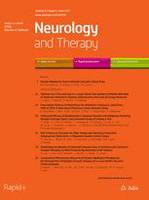
Therapeutic Advances in Neurological Disorders
Scope & Guideline
Transforming understanding into effective therapies for neurological challenges.
Introduction
Aims and Scopes
- Neurological Disorders Research:
The journal emphasizes research related to a wide range of neurological disorders, including multiple sclerosis, Parkinson's disease, epilepsy, and neuromuscular disorders. It aims to provide insights into the pathophysiology, diagnosis, and treatment of these conditions. - Clinical Trials and Efficacy Studies:
A significant focus is on clinical trials evaluating the efficacy and safety of therapeutic interventions. The journal publishes systematic reviews and meta-analyses that synthesize evidence from clinical studies to guide treatment decisions. - Innovative Therapeutic Approaches:
The journal explores novel therapeutic strategies, including pharmacological treatments, immunotherapies, and emerging technologies such as gene therapy and neurostimulation techniques. - Multidisciplinary Collaboration:
There is a strong emphasis on collaboration among various specialties within neurology, combining insights from clinical practice, basic research, and patient-centered care to advance treatment paradigms. - Patient-Centric Research:
The journal prioritizes studies that consider patient perspectives, treatment adherence, and quality of life, reflecting a commitment to improving patient outcomes in neurological disorders.
Trending and Emerging
- Precision Medicine in Neurology:
An increasing number of studies focus on precision medicine approaches, tailoring treatments based on individual patient characteristics such as genetic profiles and biomarkers. This trend is indicative of a broader movement towards personalized healthcare. - Neuroinflammation and Immune Modulation:
Research on neuroinflammation and its role in various neurological disorders is gaining prominence, with a focus on immune modulation therapies. This reflects a growing understanding of the immune system's impact on neurological health. - Digital Health and Telemedicine:
The integration of digital health technologies and telemedicine in managing neurological disorders is trending, particularly following the COVID-19 pandemic. Studies exploring the effectiveness of remote monitoring and treatment are becoming more common. - Real-World Evidence and Patient Registries:
There is a significant increase in the use of real-world evidence and patient registries to inform treatment patterns and outcomes. This trend emphasizes the importance of understanding how therapies perform in everyday clinical settings. - Machine Learning and Artificial Intelligence:
The application of machine learning and AI in predicting outcomes and personalizing treatment plans for neurological disorders is emerging as a significant area of research, reflecting the intersection of technology and medicine.
Declining or Waning
- Traditional Pharmacotherapy:
There has been a noticeable decline in publications focusing solely on traditional pharmacotherapy for neurological disorders, possibly due to the increasing interest in novel therapies and personalized medicine. - Basic Science Studies:
Research articles centered exclusively on basic science without direct clinical implications have decreased, as the journal shifts toward more translational research that bridges laboratory findings with clinical applications. - Single-Center Studies:
The prevalence of single-center observational studies has waned, likely due to a preference for multi-center collaborations that enhance the generalizability of findings and provide a broader patient perspective. - Historical Perspectives:
There is less emphasis on historical reviews of treatments and practices in neurology, as the focus has moved towards current innovations and future directions in therapeutic approaches. - Focus on Rare Disorders:
The journal appears to have reduced its emphasis on rare neurological disorders, potentially due to the limited available research and funding compared to more prevalent conditions.
Similar Journals

Expert Review of Neurotherapeutics
Empowering Research for Neurological BreakthroughsExpert Review of Neurotherapeutics is an esteemed journal published by Taylor & Francis Ltd, focusing on the rapidly evolving field of neurotherapeutics. With an ISSN of 1473-7175 and an E-ISSN of 1744-8360, this publication aims to bridge the gap between clinical and preclinical research, providing a platform for innovative therapeutic strategies in neurology and neuroscience. The journal boasts impressive impact factor rankings, categorized as Q2 in both clinical neurology and miscellaneous neuroscience, and Q1 in medical pharmacology for 2023. Its reputable placement in Scopus rankings, including Rank #82/400 in clinical neurology, underscores its significance within the medical research community. Spanning from 2001 to 2024, the journal publishes critical reviews and original research articles aimed at enhancing understanding and treatment in neurological disorders. Although it currently does not offer open access, articles published in the journal are crucial for researchers, healthcare professionals, and students seeking to stay at the forefront of advancements in neurotherapeutics. With its strong emphasis on rigorous peer-reviewed content, Expert Review of Neurotherapeutics continues to be a vital resource for those dedicated to improving patient outcomes in the realm of neurology.

Physiotherapy
Leading the Way in Sports Therapy ResearchPhysiotherapy, published by Elsevier Science Ltd, stands as a prestigious journal in the field of Physical Therapy, Sports Therapy, and Rehabilitation. Since its inception in 1945, this journal has been committed to advancing the practice and science of physiotherapy through rigorous peer-reviewed research, making significant contributions to both clinical practice and academia. With an impressive Q1 ranking and a Scopus percentile of 88th, it is widely regarded as a leading source of evidence-based information for professionals and researchers alike. The journal operates without an Open Access option, which ensures that it maintains the quality and integrity of the research it publishes while providing exclusive access to valuable insights for its subscribers. By focusing on diverse topics within its scope, including therapeutic techniques, rehabilitation strategies, and sports medicine, Physiotherapy continues to shape the future of physiotherapy practice and education, making it an essential resource for anyone invested in this dynamic field.

CNS DRUGS
Advancing Neuroscience through Innovative PharmacotherapyCNS DRUGS is a leading journal dedicated to the field of neuroscience, specifically focused on the advancement of pharmacological therapies for central nervous system disorders. Published by ADIS INT LTD, this esteemed journal has maintained a strong impact within its domain, achieving Q1 rankings in 2023 across multiple categories, including Neurology (clinical), Pharmacology (medical), and Psychiatry and Mental Health. With an impressive Scopus ranking as the 11th of 272 in medical pharmacology and high percentiles in psychiatry and neurology, it fosters high-quality research publication and dissemination. Spanning over two decades from 1994 to 2024, CNS DRUGS serves as a vital resource for researchers, professionals, and students alike, providing comprehensive insights that drive innovation in clinical practices. Although primarily a subscription-based journal, the richness of its content makes it an essential addition to any institution's library. Striving to bridge the gap between scientific research and clinical application, CNS DRUGS is positioned at the forefront of neurological and psychiatric pharmacotherapy research.

Progress in Neurology and Psychiatry
Enhancing care through cutting-edge research and discourse.Progress in Neurology and Psychiatry is a pivotal journal published by John Wiley & Sons Ltd, dedicated to advancing the fields of neurology and psychiatry. With a robust history dating back to its establishment, this esteemed journal holds a consistent Q3 ranking in 2023 across several categories including Neurology, Clinical Neurology, Psychiatry, and Mental Health, signifying its significant contribution to the scientific community. This journal serves as a vital source of knowledge and insight, publishing original research, reviews, and case studies that explore the intricacies of neurological and psychiatric disorders. Although it does not offer open access, the journal remains accessible to a wide audience through institutional subscriptions. By fostering a platform for scholarly discourse, Progress in Neurology and Psychiatry aims to bridge the gap between research and practice, ultimately enhancing the quality of care for individuals with neurological and psychiatric conditions. Researchers, clinicians, and students are encouraged to engage with the journal's comprehensive content to stay informed of the latest developments and emerging trends in these critical fields of medicine.

Archives of Neuroscience
Connecting research and therapy for neurological breakthroughs.Archives of Neuroscience is a multidisciplinary journal dedicated to advancing the field of neuroscience through the publication of original research articles, review papers, and case studies. Published by BRIEFLAND, this journal aims to bridge the gap between neuroscience research and clinical applications, fostering a deeper understanding of brain function, neurological disorders, and potential therapeutic approaches. With an ISSN of 2322-3944 and an E-ISSN of 2322-5769, Archives of Neuroscience serves as an essential platform for researchers, professionals, and students alike, encouraging open access to knowledge and insights that drive innovation in the field. Although coverage was discontinued in Scopus from 2016 to 2017, the journal continues to uphold rigorous standards of academic excellence, making it a valuable resource for the neuroscience community seeking to explore and disseminate new findings. The journal is committed to providing timely access to research tools and findings that are crucial for informed decision-making in both academic and clinical settings.

Degenerative Neurological and Neuromuscular Disease
Empowering innovation in neurological disease understanding.Degenerative Neurological and Neuromuscular Disease is a distinguished academic journal published by DOVE MEDICAL PRESS LTD, focusing on the latest advancements in the field of neurology and neuromuscular disorders. With a commitment to disseminating high-quality research, the journal aims to provide a critical platform for researchers, healthcare professionals, and students to share and engage with groundbreaking studies that advance our understanding of degenerative conditions affecting the nervous system. Although the journal's impact factor and h-index are currently not available, its open access model ensures that the valuable findings published within are accessible to a global audience, thereby fostering collaboration and innovation in neurological health. The journal's address is PO BOX 300-008, Albany, Auckland 0752, New Zealand, reflecting its international relevance and commitment to advancing the field of neurology. As the understanding of neurodegenerative diseases and neuromuscular challenges continues to evolve, Degenerative Neurological and Neuromuscular Disease serves as an essential resource for anyone dedicated to improving patient outcomes and advancing scientific knowledge.

Clinical Parkinsonism & Related Disorders
Unlocking the mysteries of Parkinson's and related conditions.Clinical Parkinsonism & Related Disorders is a prominent open-access journal published by Elsevier, focused on advancing the understanding and treatment of Parkinson's disease and related neurological conditions. Since its inception in 2019, this journal has aimed to provide a platform for high-quality research, review articles, and clinical studies dedicated to elucidating the complexities of Parkinsonism and its comorbidities. With an E-ISSN of 2590-1125, it has swiftly established its role in the field of clinical neurology, currently ranked in the Q3 quartile for clinical neurology and Q4 for cellular and molecular neuroscience. While its Scopus rankings reflect a competitive landscape, occupying the 241st position in clinical neurology and the 83rd in neuroscience, the journal remains committed to fostering scholarly dialogue and supporting innovative research. Researchers, clinicians, and students will find valuable insights within its pages, contributing to ongoing discourse and the pursuit of effective therapeutic strategies. Access to all articles has been made available since 2019, emphasizing the journal's mission to disseminate knowledge widely and enhance accessibility in the scientific community.

Neurology Research International
Connecting Researchers for a Brighter Neurological FutureNeurology Research International, published by HINDAWI LTD, is an esteemed open access journal that has been serving the neurology community since 2010. With its ISSN 2090-1852 and E-ISSN 2090-1860, this journal aims to foster knowledge dissemination and facilitate dialogue surrounding key issues in neurology and clinical neuroscience, making it a vital resource for researchers, clinicians, and students alike. It operates from the United States, with its administrative hub located in London, England. As of 2023, the journal has been positioned in the Q3 category for both neurology and clinical neurology, reflecting its commitment to advancing research within these critical fields. With a current Scopus rank of #216/400 in clinical neurology and a #113/192 in neuroscience, and a converged publication timeline from 2010 to 2024, Neurology Research International is dedicated to promoting high-quality research that addresses contemporary challenges and innovations in neurological science. By offering open access since its inception, it ensures that cutting-edge research is freely available, aligning with the global push towards accessible scientific communication.

Aktualnosci Neurologiczne
Advancing Knowledge in Neurology Since 2005Aktualnosci Neurologiczne is a renowned open-access journal dedicated to the field of neurology, published by Medical Communications. As a crucial platform for the dissemination of neurological research, it has been operational since 2005, fostering an inclusive environment for scientific discourse and innovation. With an ISSN of 1641-9227, the journal aims to bridge the gap between clinical practice and research, offering a diverse range of articles that cover the latest developments in neurological science. Although its coverage in Scopus was discontinued after 2017, the journal continues to maintain a robust archive of scholarly articles that contribute to understanding neurological disorders. Researchers, healthcare professionals, and students interested in the latest trends and studies in neurology will find Aktualnosci Neurologiczne an invaluable resource, providing insights that drive advancements in the field. The journal operates from its address in Warsaw, Poland, and invites contributions from the global research community to enrich its content and impact.

Neurology and Therapy
Exploring Innovations in Neurology and Therapeutic SolutionsNeurology and Therapy, published by SPRINGER LONDON LTD, stands as a pivotal platform for researchers and practitioners in the field of neurology and its therapeutic applications. This Open Access journal, active since 2012, facilitates the dissemination of innovative studies and cutting-edge findings aimed at improving neurological health. With an impressive ranking in the 2023 Scopus Rankings, where it holds a Q2 category in Neurology and a Q1 category in Clinical Neurology, it underscores its prominence in advancing neurological research. The journal's intriguing scope encompasses a wide-ranging exploration of neurological disorders, treatment methodologies, and healthcare strategies, making it a valuable resource for those vested in enhancing patient outcomes. With an appealing average impact factor, readers are encouraged to dive into the latest advancements and engage with the scholarly discussions that are shaping the future of neurology.